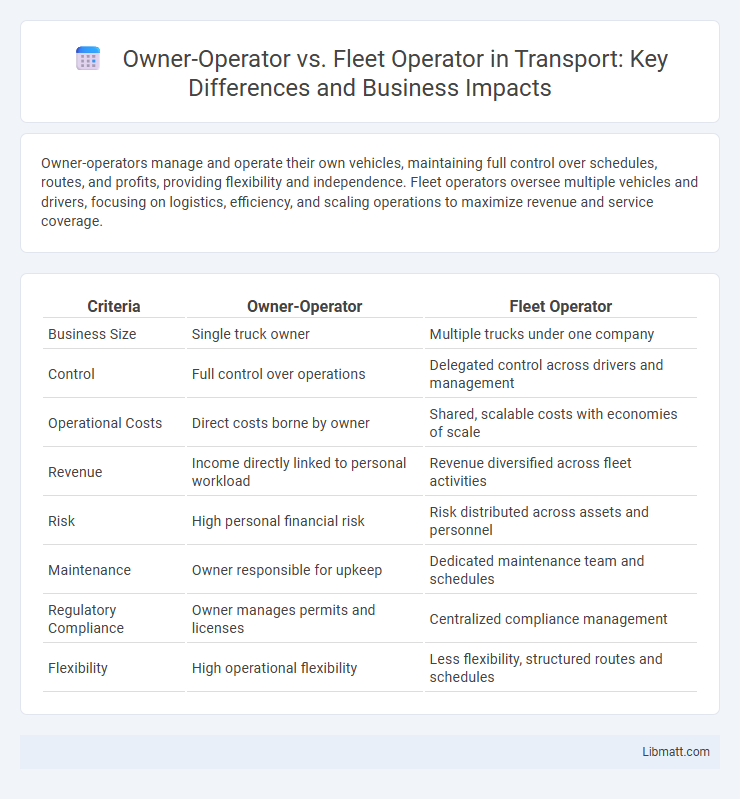Owner-operators manage and operate their own vehicles, maintaining full control over schedules, routes, and profits, providing flexibility and independence. Fleet operators oversee multiple vehicles and drivers, focusing on logistics, efficiency, and scaling operations to maximize revenue and service coverage.
Table of Comparison
| Criteria | Owner-Operator | Fleet Operator |
|---|---|---|
| Business Size | Single truck owner | Multiple trucks under one company |
| Control | Full control over operations | Delegated control across drivers and management |
| Operational Costs | Direct costs borne by owner | Shared, scalable costs with economies of scale |
| Revenue | Income directly linked to personal workload | Revenue diversified across fleet activities |
| Risk | High personal financial risk | Risk distributed across assets and personnel |
| Maintenance | Owner responsible for upkeep | Dedicated maintenance team and schedules |
| Regulatory Compliance | Owner manages permits and licenses | Centralized compliance management |
| Flexibility | High operational flexibility | Less flexibility, structured routes and schedules |
Introduction to Owner-Operator vs Fleet Operator
Owner-operators manage their own trucks and operate independently, controlling schedules, maintenance, and finances, which allows for higher flexibility but also increased responsibility. Fleet operators oversee multiple drivers and vehicles, concentrating on logistics, route optimization, and fleet maintenance to ensure efficiency and scalability. Understanding the distinctions between owner-operators and fleet operators is crucial for making informed decisions in the trucking industry.
Definition: What is an Owner-Operator?
An owner-operator is an independent truck driver who owns and operates their own vehicle, managing both driving and business responsibilities. Unlike fleet operators who oversee multiple vehicles and drivers, owner-operators maintain full control over their schedules, routes, and maintenance. Your success as an owner-operator depends on balancing operational efficiency with personalized service.
Definition: What is a Fleet Operator?
A fleet operator is an individual or company responsible for managing multiple commercial vehicles used for transportation or logistics purposes. Their role includes overseeing vehicle maintenance, route planning, driver management, and regulatory compliance to ensure efficient and cost-effective operations. Unlike owner-operators who typically manage a single vehicle, fleet operators optimize resources across a larger scale to maximize productivity and profitability.
Key Differences Between Owner-Operators and Fleet Operators
Owner-operators manage and operate their own trucking business, owning a single or a few vehicles, which allows for greater autonomy and direct control over operations but comes with higher personal financial risk. Fleet operators oversee multiple trucks and drivers, coordinating logistics, maintenance, and compliance across a larger scale to achieve operational efficiency and economies of scale. Key differences include the scope of responsibility, financial investment, and administrative complexity, with owner-operators focused on individual vehicle management and fleet operators concentrated on managing extensive transportation networks.
Advantages of Being an Owner-Operator
Being an owner-operator offers greater independence and control over your routes, schedules, and business decisions, leading to increased flexibility and personalized service. You retain a larger share of the profits since you manage your own expenses, allowing for potentially higher earnings compared to fleet operators. This autonomy also builds valuable entrepreneurial skills and the opportunity to scale your business according to your goals.
Benefits of Running a Fleet Operation
Running a fleet operation offers significant benefits such as economies of scale, enabling lower per-unit costs through bulk purchasing and streamlined maintenance processes. Fleet operators can leverage advanced logistics software to optimize route planning, enhance fuel efficiency, and improve overall operational control. Access to better financing options and diversified revenue streams further strengthens financial stability compared to individual owner-operators.
Challenges Faced by Owner-Operators
Owner-operators face challenges including high operational costs, unpredictable income, and the burden of managing both driving and business responsibilities. Unlike fleet operators, they lack economies of scale, making fuel, maintenance, and insurance expenses more impactful on profitability. Your ability to effectively navigate regulations and secure consistent contracts directly influences the sustainability of their business.
Challenges in Fleet Management
Owner-operators face challenges in fleet management such as limited capital for vehicle maintenance and upgrades, leading to higher downtime and operational costs. Fleet operators encounter complexities in coordinating multiple drivers, optimizing routes efficiently, and ensuring compliance with regulatory standards across various jurisdictions. Both must address fuel management, driver retention, and real-time tracking to maintain profitability and service reliability.
Financial Considerations: Cost, Revenue, and Profitability
Owner-operators typically face higher upfront costs for vehicle purchase and maintenance but have greater control over revenue, directly impacting their profitability. Fleet operators benefit from economies of scale, allowing them to negotiate better rates on fuel, insurance, and bulk maintenance, reducing overall operating expenses. Your profitability will depend on managing these costs efficiently while maximizing revenue streams, with owner-operators needing to balance variable expenses against potential higher income per load.
Choosing Between Owner-Operator and Fleet Operator Models
Choosing between owner-operator and fleet operator models depends on your goals for control, income, and risk management. Owner-operators typically enjoy greater autonomy and potential profit margins by managing their own trucks but face higher responsibilities such as maintenance and compliance. Fleet operators benefit from economies of scale, consistent revenue streams, and shared operational tasks, though they may sacrifice some personal freedom and direct asset control.
owner-operator vs fleet operator Infographic

 libmatt.com
libmatt.com